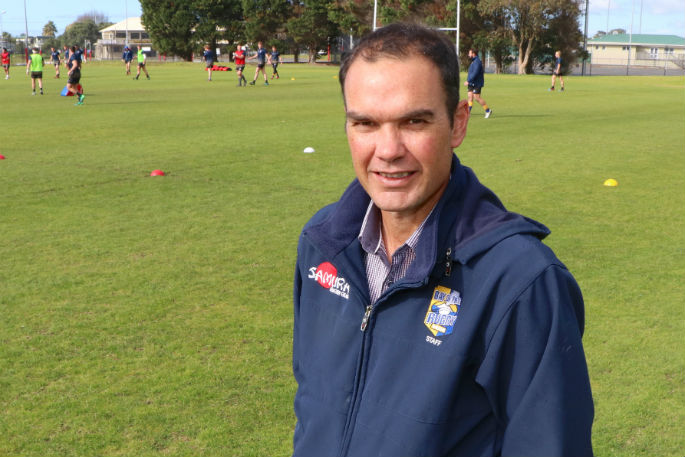Rugby's business boss in the Bay of Plenty only needs to glance around the family dinner table each evening to see where his game is headed. And probably the dirty boots at the back door.
There's 13-year-old Sophie Rogers, Emma's 11 and Matthew is nine – and Dad Mike, CEO of the Bay of Plenty Rugby Union, thinks they are the model for the future direction of rugby.
'Three children, two of them girls, and they have all experienced different forms of rugby – contact, non-contact, for school and for club.” And no pressure from Dad. 'It was their choice,” says Mike,
'I guess we hope one day when my kids have children, they will say rugby is a good option, not just to play sport but to learn values, life lessons that are important in the real world, that will transition them into being good people. And that might encourage daughters and sons to play in the future.”
So there's more to rugby these days than cold Saturday afternoons and mud, liniment and oranges, winning and clubhouse beers with the blokes, the traditional way rugby was delivered.
'I know a lot of attention goes into the performance end of the game, the Steamers and the Mitre 10 Cup, but for us, the biggest focus is growing the game and using rugby as a vehicle to make our community better,” – whether it be for health, social well-being, education, all things that intrinsically come with sport.
It might make rugby's forefathers shudder in their graves, but the game these days may even have participants who never make a tackle.
'They are still regular participants,” says Mike Rogers. 'They go through the whole experience of playing rugby and play non-contact versions of the game. They might play modified versions of the game. It doesn't mean they're not a rugby player to us.”
It just means rugby is delivered differently.
'We're definitely trying to evolve the way we deliver our sport and to meet the demands of our society.”
And if they do it right they have a captive audience from a young age.
'Our job is to ensure they stay motivated and engaged in our game both male and female all the way through to adult life.”
Overall, the CEO's positive message about BOP rugby is that the code has grown.
'Yes, but skewed to our younger population.”
And that's reflected in a Deloitte report into ‘the state of the union' – rugby union – which tells us player registrations in the Mitre 10 Cup competition clubs were up, largely due to young children and the growing interest of women and girls in playing the game. But there was a 'significant” 7.8 per cent drop in the secondary school age group. Registrations for college rugby in 2018 were the lowest since before 2010.
'It is a bit of a bottleneck where kids drop out of our game,” says Mike. 'But it's not just a rugby issue, it's a sport issue.”
And he puts it down to society and culture being markedly different to what it was 10 or 15 years ago.
Deloitte expands that theory into curious territory - busier people, work demands, social pressures such as mental health, economic and environmental sustainability, and diversity and inclusion pre-occupying the thoughts of our youth. All impacting the national game. And Deloitte says diversity and inclusion should be a critical focus for any organisation seeking to survive in the 21st century.
And all the time a rugby nation believes the game's most pressing problem is Brodie Retallick's dicky shoulder and winning a Rugby World Cup.
In our own rugby backyard, the numbers are encouraging.
'Our game, especially at the youth level, is growing faster than we can cater for,” says Mike Rogers. 'So in terms of infrastructure and resources, if we had more money to invest in our game, we would see even greater growth. No doubt about it.”
Money, revenue streams are the rub – it's a tough environment out there. Nationally, Mike says there's ongoing pressure on cash reserves.
'They have been making losses over the last few years and we can't keep doing it. No business can,” says the CEO. 'Financially it is really challenging for us to do what we want to do in our community.”
The BOP Rugby Union's main revenue streams are NZ Rugby grants, commercial partnerships, sponsorships and trust funding – pokies - to fund the community game.
'All three are quite volatile revenue streams. Even gaming is under its own pressures. And it's incredibly difficult to find local businesses who want to support the game.”
That's because businesses themselves are challenged and some don't see correlation of investing in sport. So it's Mike's job to find new money – he's gone outside the Bay, to China, Japan, Hong Kong and USA.
'We need to think creatively and innovatively around what future revenue streams are going to look like and how do we fund our game beyond those traditional sources.”
Like its plans for a 100-bed accommodation block almost next door to its headquarters at Blake Park in Mount Maunganui – a multi-sports facility that will turn some dollars.
'If you look at the history of Bay of Plenty rugby, it's had some pretty perilous points in its lifetime and it's over a hundred years old.
'But we have worked hard over four or five years to put a good cash reserves policy in place. We don't ever want BOP rugby or our community to face the situation again where we can't do what we want to do with our game. And that is to grow it.”
The Bay of Plenty Steamers play their first home game of the 2019 Mitre 10 Cup against Otago at the Tauranga Domain on Sunday August 11 at 2.05pm.



0 comments
Leave a Comment
You must be logged in to make a comment.